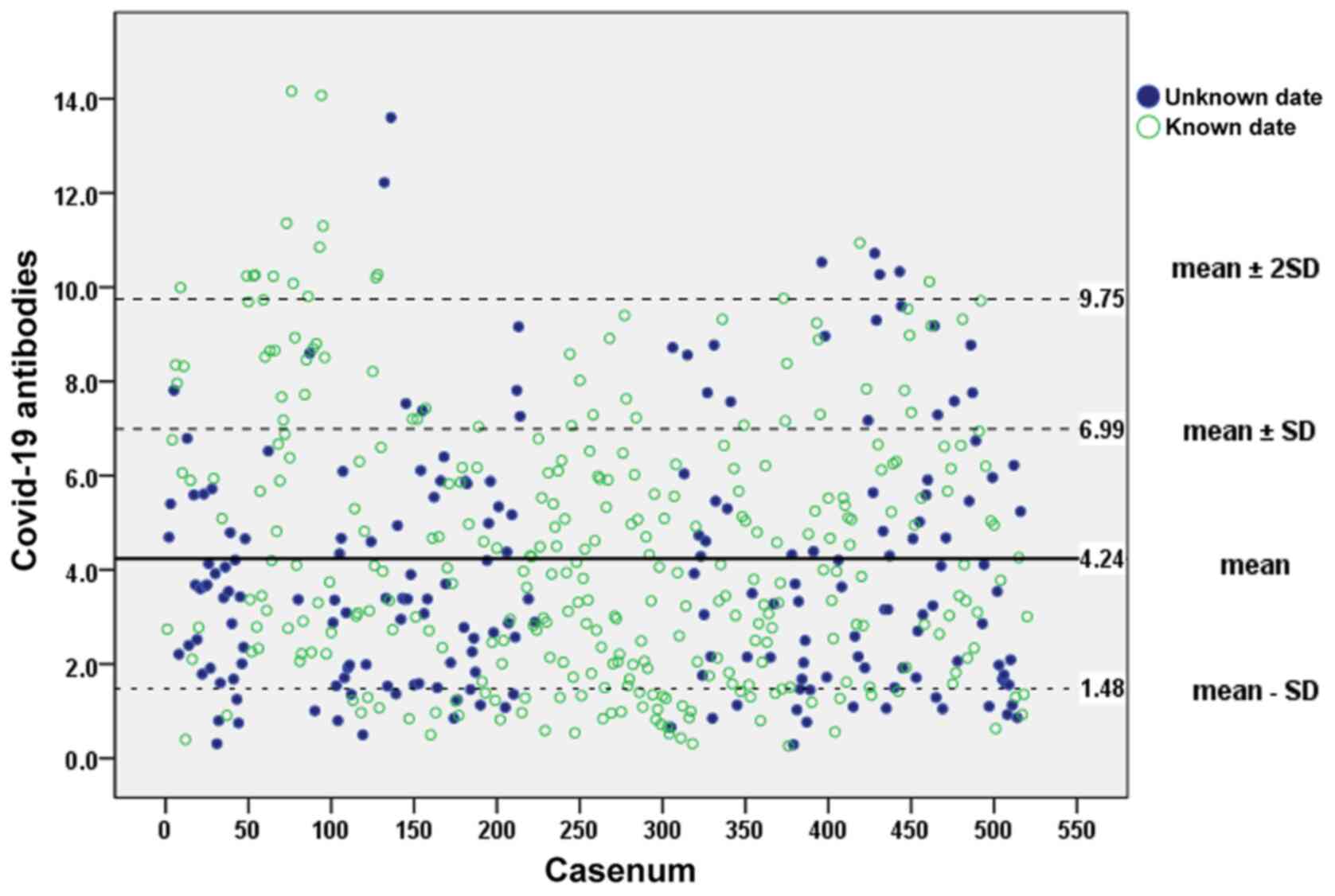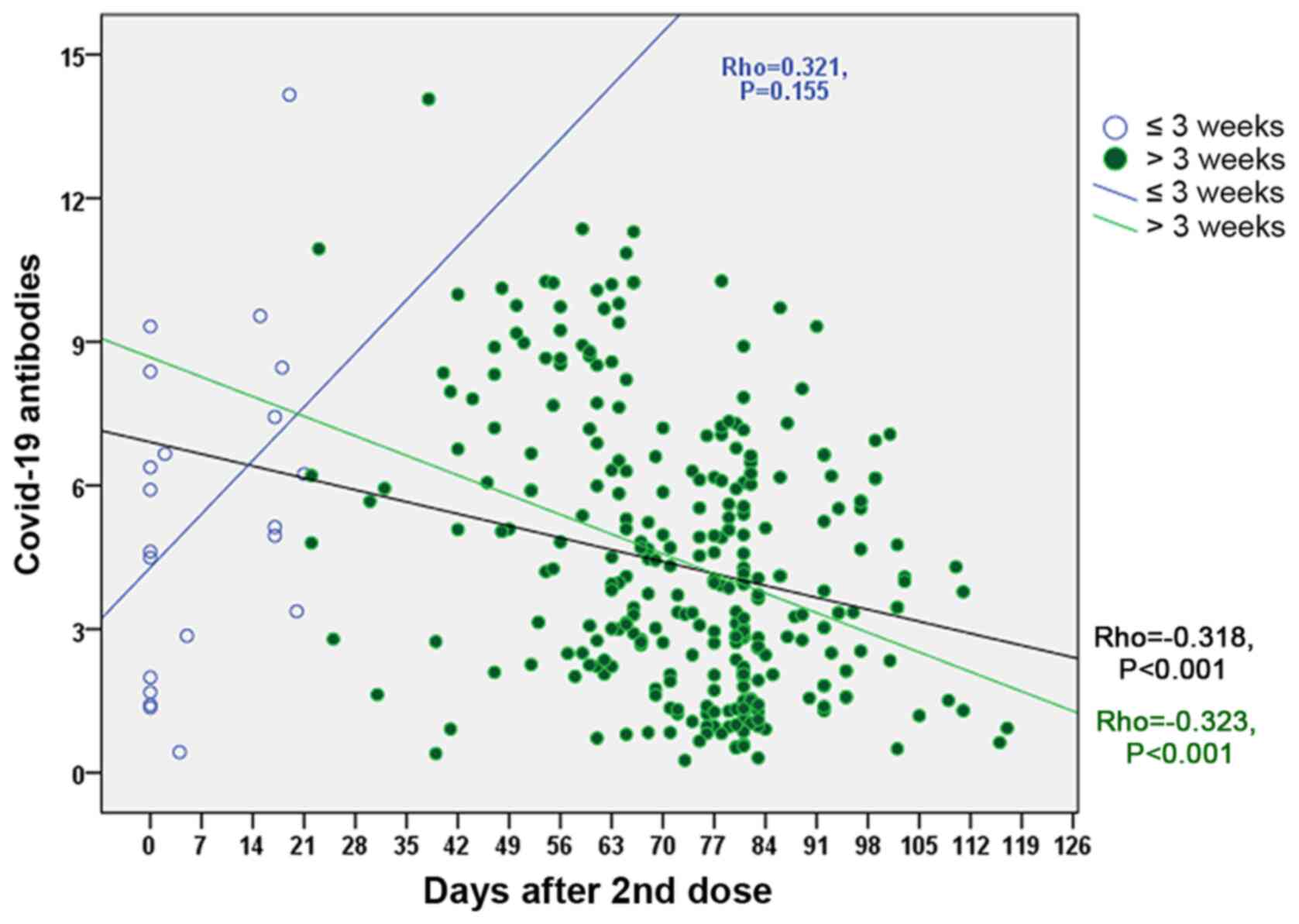|
1
|
Docea AO, Tsatsakis A, Albulescu D,
Cristea O, Zlatian O, Vinceti M, Moschos SA, Tsoukalas D, Goumenou
M, Drakoulis N, et al: A new threat from an old enemy: Re-emergence
of coronavirus (Review). Int J Mol Med. 45:1631–1643. 2020.
|
|
2
|
Neagu M, Calina D, Docea AO, Constantin C,
Filippini T, Vinceti M, Drakoulis N, Poulas K, Nikolouzakis TK,
Spandidos DA, et al: Back to basics in COVID-19: Antigens and
antibodies-Completing the puzzle. J Cell Mol Med. 25:4523–4533.
2021. View Article : Google Scholar
|
|
3
|
Latinne A, Hu B, Olival KJ, Zhu G, Zhang
L, Li H, Chmura AA, Field HE, Zambrana-Torrelio C, Epstein JH, et
al: Origin and cross-species transmission of bat coronaviruses in
China. Nat Commun. 11:42352020. View Article : Google Scholar
|
|
4
|
Mittal A, Manjunath K, Ranjan RK, Kaushik
S, Kumar S and Verma V: COVID-19 pandemic: Insights into structure,
function, and hACE2 receptor recognition by SARS-CoV-2. PLoS
Pathog. 16:e10087622020. View Article : Google Scholar
|
|
5
|
Walls AC, Park YJ, Tortorici MA, Wall A,
McGuire AT and Veesler D: Structure, Function, and Antigenicity of
the SARS-CoV-2 Spike Glycoprotein. Cell. 181:281–292.e6. 2020.
View Article : Google Scholar
|
|
6
|
Hoffmann M, Kleine-Weber H, Schroeder S,
Krüger N, Herrler T, Erichsen S, Schiergens TS, Herrler G, Wu NH,
Nitsche A, et al: SARS-CoV-2 Cell Entry Depends on ACE2 and TMPRSS2
and Is Blocked by a Clinically Proven Protease Inhibitor. Cell.
181:271–280.e8. 2020. View Article : Google Scholar
|
|
7
|
Min L and Sun Q: Antibodies and Vaccines
Target RBD of SARS-CoV-2. Front Mol Biosci. 8:6716332021.
View Article : Google Scholar
|
|
8
|
Calina D, Hartung T, Mardare I, Mitroi M,
Poulas K, Tsatsakis A, Rogoveanu I and Docea AO: COVID-19 pandemic
and alcohol consumption: Impacts and interconnections. Toxicol Rep.
8:529–535. 2021. View Article : Google Scholar
|
|
9
|
Pennisi M, Lanza G, Falzone L, Fisicaro F,
Ferri R and Bella R: Sars-cov-2 and the nervous system: From
clinical features to molecular mechanisms. Int J Mol Sci. 21:1–21.
2020. View Article : Google Scholar
|
|
10
|
Silva FAFD, Brito BB, Santos MLC, Marques
HS, Silva Júnior RTD, Carvalho LS, Vieira ES, Oliveira MV and Melo
FF: COVID-19 gastrointestinal manifestations: A systematic review.
Rev Soc Bras Med Trop. 53:e202007142020. View Article : Google Scholar
|
|
11
|
Falzone L, Gattuso G, Tsatsakis A,
Spandidos DA and Libra M: Current and innovative methods for the
diagnosis of COVID-19 infection (Review). Int J Mol Med. 47:472021.
View Article : Google Scholar
|
|
12
|
Thakkar S, Arora S, Kumar A, Jaswaney R,
Faisaluddin M, Ammad Ud Din M, Shariff M, Barssoum K, Patel HP,
Nirav A, et al: A Systematic Review of the Cardiovascular
Manifestations and Outcomes in the Setting of Coronavirus-19
Disease. Clin Med Insights Cardiol. 14:11795468209771962020.
View Article : Google Scholar
|
|
13
|
Tsatsakis A, Calina D, Falzone L, Petrakis
D, Mitrut R, Siokas V, Pennisi M, Lanza G, Libra M, Doukas SG, et
al: SARS-CoV-2 pathophysiology and its clinical implications: An
integrative overview of the pharmacotherapeutic management of
COVID-19. Food Chem Toxicol. 146:1117692020. View Article : Google Scholar
|
|
14
|
Sidiropoulou P, Docea AO, Nikolaou V,
Katsarou MS, Spandidos DA, Tsatsakis A, Calina D and Drakoulis N:
Unraveling the roles of vitamin D status and melanin during
COVID-19 (Review). Int J Mol Med. 47:92–100. 2021. View Article : Google Scholar
|
|
15
|
Skalny AV, Rink L, Ajsuvakova OP, Aschner
M, Gritsenko VA, Alekseenko SI, Svistunov AA, Petrakis D, Spandidos
DA, Aaseth J, et al: Zinc and respiratory tract infections:
Perspectives for COVID-19 (Review). Int J Mol Med. 46:17–26.
2020.
|
|
16
|
Kostoff RN, Kanduc D, Porter AL, Shoenfeld
Y, Calina D, Briggs MB, Spandidos DA and Tsatsakis A: Vaccine-and
natural infection-induced mechanisms that could modulate vaccine
safety. Toxicol Rep. 7:1448–1458. 2020. View Article : Google Scholar
|
|
17
|
Moura DTH, McCarty TR, Ribeiro IB, Funari
MP, Oliveira PVAG, Miranda Neto AA, Monte Júnior ESD, Tustumi F,
Bernardo WM, Moura EGH, et al: Diagnostic characteristics of
serological-based COVID-19 testing: A systematic review and
meta-analysis. Clinics (São Paulo). 75:e22122020. View Article : Google Scholar
|
|
18
|
Kubina R and Dziedzic A: Molecular and
serological tests for COVID-19 A comparative review of SARS-CoV-2
coronavirus laboratory and point-of-care diagnostics. Diagnostics
(Basel). 10:4342020. View Article : Google Scholar
|
|
19
|
Childs CE, Calder PC and Miles EA: Diet
and immune function. Nutrients. 11:19332019. View Article : Google Scholar
|
|
20
|
Mikkelsen K and Apostolopoulos V: Vitamin
B12, Folic Acid, and the Immune System. Nutrition and Immunity.
Springer International Publishing; New York, NY: pp. 103–114. 2019,
View Article : Google Scholar
|
|
21
|
The Lancet Respiratory Medicine: COVID-19
transmission -up in the air. Lancet Respir Med. 8:11592020.
View Article : Google Scholar
|
|
22
|
Farsalinos K, Poulas K, Kouretas D,
Vantarakis A, Leotsinidis M, Kouvelas D, Docea AO, Kostoff R,
Gerotziafas GT, Antoniou MN, et al: Improved strategies to counter
the COVID-19 pandemic: Lockdowns vs. primary and community
healthcare. Toxicol Rep. 8:1–9. 2021. View Article : Google Scholar
|
|
23
|
Tsatsakis A, Petrakis D, Nikolouzakis TK,
Docea AO, Calina D, Vinceti M, Goumenou M, Kostoff RN, Mamoulakis
C, Aschner M, et al: COVID-19, an opportunity to reevaluate the
correlation between long-term effects of anthropogenic pollutants
on viral epidemic/pandemic events and prevalence. Food Chem
Toxicol. 141:1114182020. View Article : Google Scholar
|
|
24
|
Goumenou M, Sarigiannis D, Tsatsakis A,
Anesti O, Docea AO, Petrakis D, Tsoukalas D, Kostoff R, Rakitskii
V, Spandidos DA, et al: COVID-19 in Northern Italy: An integrative
overview of factors possibly influencing the sharp increase of the
outbreak (Review). Mol Med Rep. 22:20–32. 2020.
|
|
25
|
Pott-Junior H, Paoliello MMB, Miguel AQC,
da Cunha AF, de Melo Freire CC, Neves FF, da Silva de Avó LR,
Roscani MG, Dos Santos SS and Chachá SGF: Use of ivermectin in the
treatment of Covid-19: A pilot trial. Toxicol Rep. 8:505–510. 2021.
View Article : Google Scholar
|
|
26
|
Vivarelli S, Falzone L, Torino F,
Scandurra G, Russo G, Bordonaro R, Pappalardo F, Spandidos DA,
Raciti G and Libra M: Immune-checkpoint inhibitors from cancer to
COVID-19: A promising avenue for the treatment of patients with
COVID-19 (Review). Int J Oncol. 58:145–157. 2021. View Article : Google Scholar
|
|
27
|
Lam S, Lombardi A and Ouanounou A:
COVID-19: A review of the proposed pharmacological treatments. Eur
J Pharmacol. 886:1734512020. View Article : Google Scholar
|
|
28
|
Hashem AM, Alghamdi BS, Algaissi AA,
Alshehri FS, Bukhari A, Alfaleh MA and Memish ZA: Therapeutic use
of chloroquine and hydroxychloroquine in COVID-19 and other viral
infections: A narrative review. Travel Med Infect Dis.
35:1017352020. View Article : Google Scholar
|
|
29
|
Vivarelli S, Falzone L, Grillo CM,
Scandurra G, Torino F and Libra M: Cancer Management during
COVID-19 Pandemic: Is Immune Checkpoint Inhibitors-Based
Immunotherapy Harmful or Beneficial? Cancers (Basel). 12:1–22.
2020. View Article : Google Scholar
|
|
30
|
Calina D, Docea AO, Petrakis D, Egorov A
M, Ishmukhametov AA, Gabibov AG, Shtilman MI, Kostoff R, Carvalho
F, Vinceti M, et al: Towards effective COVID-19 vaccines: Updates,
perspectives and challenges (Review). Int J Mol Med. 46:3–16. 2020.
View Article : Google Scholar
|
|
31
|
Calina D, Sarkar C, Arsene AL, Salehi B,
Docea AO, Mondal M, Islam MT, Zali A and Sharifi-Rad J: Recent
advances, approaches and challenges in targeting pathways for
potential COVID-19 vaccines development. Immunol Res. 68:315–324.
2020. View Article : Google Scholar
|
|
32
|
Polack FP, Thomas SJ, Kitchin N, Absalon
J, Gurtman A, Lockhart S, Perez JL, Pérez Marc G, Moreira ED,
Zerbini C, et al C4591001 Clinical Trial Group: Safety and Efficacy
of the BNT162b2 mRNA Covid-19 Vaccine. N Engl J Med. 383:2603–2615.
2020. View Article : Google Scholar
|
|
33
|
Centers for Disease Control and Prevention
(CDC): Understanding mRNA COVID-19 Vaccines. CDC; Atlanta, GA:
2021, https://www.cdc.gov/coronavirus/2019-ncov/vaccines/different-vaccines/mrna.html
Updated March 4, 2021.
|
|
34
|
Sadoff J, Gray G, Vandebosch A, Cárdenas
V, Shukarev G, Grinsztejn B, Goepfert PA, Truyers C, Fennema H,
Spiessens B, et al; ENSEMBLE Study Group. Safety and Efficacy of
Single-Dose Ad26.COV2.S Vaccine against Covid-19. N Engl J Med.
384:2187–2201. 2021. View Article : Google Scholar
|
|
35
|
Baden LR, El Sahly HM, Essink B, Kotloff
K, Frey S, Novak R, Diemert D, Spector SA, Rouphael N, Creech CB,
et al; COVE Study Group. Efficacy and Safety of the mRNA-1273
SARS-CoV-2 Vaccine. N Engl J Med. 384:403–416. 2021. View Article : Google Scholar
|
|
36
|
Voysey M, Clemens SAC, Madhi SA, Weckx LY,
Folegatti PM, Aley PK, Angus B, Baillie VL, Barnabas SL, Bhorat QE,
et al: Oxford COVID Vaccine Trial Group: Safety and efficacy of the
ChAdOx1 nCoV-19 vaccine (AZD1222) against SARS-CoV-2: An interim
analysis of four randomised controlled trials in Brazil, South
Africa, and the UK. Lancet. 397:99–111. 2021. View Article : Google Scholar
|
|
37
|
Alexandris N, Lagoumintzis G, Chasapis CT,
Leonidas DD, Papadopoulos GE, Tzartos SJ, Tsatsakis A, Eliopoulos
E, Poulas K and Farsalinos K: Nicotinic cholinergic system and
COVID-19: In silico evaluation of nicotinic acetylcholine receptor
agonists as potential therapeutic interventions. Toxicol Rep.
8:73–83. 2020. View Article : Google Scholar
|
|
38
|
Hernández AF, Calina D, Poulas K, Docea AO
and Tsatsakis AM: Safety of COVID-19 vaccines administered in the
EU: Should we be concerned? Toxicol Rep. 8:871–879. 2021.
View Article : Google Scholar
|
|
39
|
Gerbase-DeLima M, de Marco R, Monteiro F,
Tedesco-Silva H, Medina-Pestana JO and Mine KL: Impact of
Combinations of Donor and Recipient Ages and Other Factors on
Kidney Graft Outcomes. Front Immunol. 11:9542020. View Article : Google Scholar
|
|
40
|
Petrakis D, Margină D, Tsarouhas K, Tekos
F, Stan M, Nikitovic D, Kouretas D, Spandidos DA and Tsatsakis A:
Obesity -a risk factor for increased COVID-19 prevalence, severity
and lethality (Review). Mol Med Rep. 22:9–19. 2020. View Article : Google Scholar
|
|
41
|
Favresse J, Bayart J-L, Mullier F, Elsen
M, Eucher C, Van Eeckhoudt S, Roy T, Wieers G, Laurent C, Dogné JM,
et al: Antibody titres decline 3-month post-vaccination with
BNT162b2. Emerg Microbes Infect. 10:1495–1498. 2021. View Article : Google Scholar
|
|
42
|
Zurac S, Nichita L, Mateescu B, Mogodici
C, Bastian A, Popp C, Cioplea M, Socoliu C, Constantin C and Neagu
M: COVID-19 vaccination and IgG and IgA antibody dynamics in
healthcare workers. Mol Med Rep. 24:5782021. View Article : Google Scholar
|
|
43
|
Nielsen SS, Vibholm LK, Monrad I, Olesen
R, Frattari GS, Pahus MH, Højen JF, Gunst JD, Erikstrup C,
Holleufer A, et al: SARS-CoV-2 elicits robust adaptive immune
responses regardless of disease severity. EBioMedicine.
68:1034102021. View Article : Google Scholar
|

















